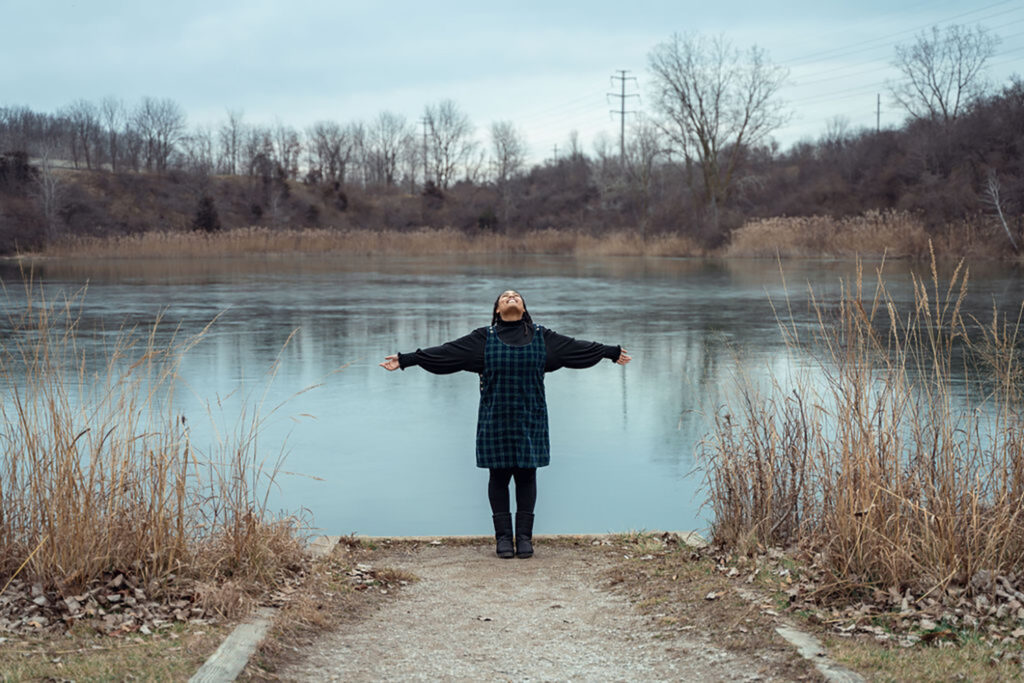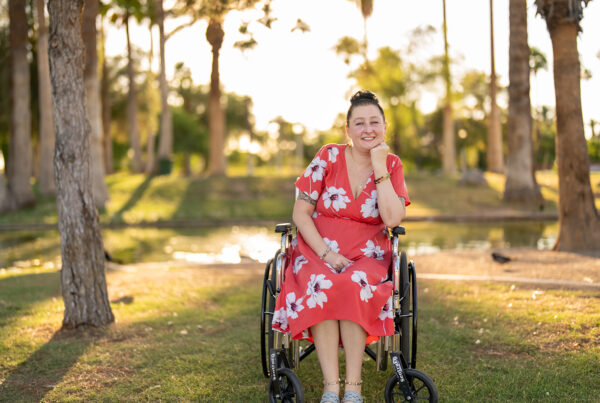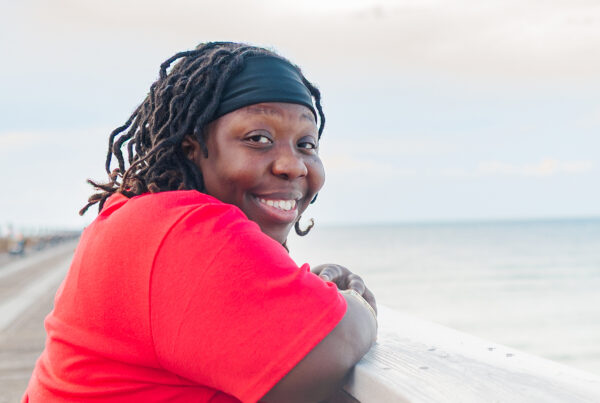Leah woke up feeling agitated and distressed one morning in late September 2022 and decided she would go for a drive. Her mental health had been plummeting for some time and her behavior became increasingly erratic. Before getting in her car, she obscured her license plate by fully covering it with red tape, which is illegal. She wasn’t totally sure why she did it. It was, in part, a sign of her deteriorating mental health and she may have been trying to provoke a response from law enforcement. The 25-year-old Ann Arbor resident then drove aimlessly for hundreds of miles. As she made her way throughout different parts of Michigan, hours ticked by. At one point, she noticed the police were following her. Leah said she ignored their signals for her to pull over and eventually they stopped following her. It’s not clear why they left her alone. When she reached Ohio, she turned around and drove back home.
Leah had recently been experiencing thoughts of suicide and engaged in self-harming behavior. She had been hospitalized several times in the previous months, and over her life, psychiatrists diagnosed her with different mood and personality disorders. Despite hospitalization, she still hadn’t found a treatment plan that worked.

When Leah went outside later that evening, she noticed her car was missing. After learning it had been towed, she went to the impound lot to pick it up, but by the time she got there, it was closed. In desperation, Leah jumped the fence, got inside her car, and started driving, but all the gates were locked. Frantic, she called a friend for help. The friend, who was aware that Leah had in the past struggled with her mental health, was worried by her behavior and how she sounded; she told her to dial 911 so the police could help by taking her to the hospital. Before Leah had the chance, the police arrived, who didn’t know that she was having a mental health crisis. Confused and frightened, she ignored their orders to exit her vehicle, instead driving in small tight circles inside the locked parking lot.
When the police eventually arrested Leah, she tried explaining that she was having a mental health crisis. But instead of taking her to the hospital, the police booked her into the Washtenaw County Jail and charged her with fleeing a police officer, resisting arrest, and reckless driving.
“I was told I would get mental health help at the jail, but I didn’t. Instead, I was put in an anti-suicide jacket and kept alone in a cell.”
Leah hadn’t realized it yet, but she had just been swept into a complex and difficult-to-understand legal system that consists of jails, mental health diversion programs, and court appearances. People with mental illness, in particular, can encounter a justice system that at every stage seems ill-equipped to meet the needs of this population. “I was told I would get mental health help at the jail, but I didn’t,” Leah said. “Instead, I was put in an anti-suicide jacket and kept alone in a cell.” Her journey to recovery would be made much more difficult by this unwieldy and cumbersome bureaucracy.
Each year, up to two million people experiencing a mental health crisis are booked into jails and prisons. Studies suggest that most of these arrests are for nonviolent misdemeanor offenses, like Leah’s, such as trespassing or theft. Unable to advocate for themselves, many people end up languishing behind bars where they don’t receive the treatment they need. Often, their condition gets worse. The long-term consequences of an arrest are also dire – without a strong support system, many face an uphill battle in finding jobs or housing. As a result of incarceration, some lose access to healthcare and benefits, preventing them from accessing needed mental health care. At the same time, these individuals are also expected to navigate an already complicated and confusing pretrial justice system.

Leah’s mental health struggles have been a life-long battle. The soft-spoken Michigander is empathetic and sensitive to others. She was adopted into a small family when she was around six months old. As an only child, she felt lonely at times and craved the company of friends and family. “I had a decent upbringing but there was some physical and verbal abuse,” she said. “My mom would call me all these names and it would just hurt so bad that I hated myself.”
“I really wanted friends and to feel connected with people.”
As she grew older, the abuse at home worsened. School was no reprieve. She was bullied and struggled to fit in. To cope, Leah would write poetry or music. Creative writing and open mic performances were some of her favorite activities. She was also seeing a therapist, but they failed to diagnose her depression. “I really wanted friends and to feel connected with people,” she said. After high school, Leah attended Eastern Michigan University. Her mental health problems were impacting her ability to focus and she eventually dropped out. Later, she attended a college in Minnesota. After failing that program, she left feeling hopeless. That’s when her mental health took a turn for the worse. “I felt down and like I wasn’t good enough,” she said. “Like I didn’t belong there.”
In recent years, states and local communities across the country – including Michigan – have tried to tackle mental health crises by creating alternatives to incarceration. People in a mental health emergency who come in contact with law enforcement, for example, may be diverted to mental health court or placed into mental health treatment programs. These efforts also include educating the police and other first responders about best practices for helping someone they come across who is experiencing a mental health emergency.
After a few days in jail, Leah’s husband paid her bail and she was released. Her public defender put her in touch with The Bail Project and our team in Michigan provided her with court reminders and offered her free transportation to and from court. Leah was thankful to be home, but her mental health remained fragile. Her public defender referred her to Washtenaw County’s Mental Health Treatment Court, hopeful that were she admitted, she would be able to avoid any future jail time or have her case dismissed altogether. The program allows people with mental illnesses who come in contact with the justice system to be diverted into supervised community-based treatment programs and court staff and mental health professionals work to develop a treatment plan.

Leah learned two months later that she had not been accepted into the program. The county’s public mental health agency excludes people with certain diagnoses from participating, which advocates argue is one of the limitations of the Mental Health Treatment Court. Leah was told she didn’t qualify because one of her diagnoses included borderline personality disorder. Her public defender told her he would be reaching out to the prosecutor to see how her case may be resolved without the program. Overwhelmed by the gravity of the situation, Leah hurt herself and was admitted to a psychiatric hospital. Her court case was delayed as a result.
It wasn’t until after Leah’s court case had closed that she realized how unwell she had been. But by then it was too late: she was convicted and sentenced to 12 and 18 months consecutive probation and required to get mental health treatment, continue therapy, submit to medical evaluations, and pay $2,000 in fines and fees.
“When I was in court I didn’t understand what was happening to me. I was still dealing with my mental health. But now that I’m better it’s too late.”
For the majority of her time in court, Leah didn’t understand the process and what her options meant – a fact that highlights one of the challenges associated with managing mental health issues within court settings. When people are experiencing an acute psychiatric crisis, it can be difficult for them to exercise good judgment, which can be detrimental to their case and outcomes. “When I was in court I didn’t understand what was happening to me. I was still dealing with my mental health,” Leah said. “But now that I’m better it’s too late.”
In situations where there is reasonable doubt that a person does not understand the nature of the legal proceedings or is unable to assist in their own defense, a mental competency hearing can be requested. A defendant’s competency can be called into question at any point during court proceedings by either the defense attorney, prosecution, or judge. As soon as doubts are raised, the judge is responsible for putting the underlying case on hold so that a competency hearing can be conducted first. Leah is unsure why questions about her competency weren’t raised sooner.
Like thousands of other people across the United States who have been convicted of nonviolent misdemeanors as a result of a mental health crisis, Leah’s situation has significantly affected her job prospects. She had recently been hired to work at a psychiatric hospital where she had previously been a patient, but after a background check her job offer was rescinded. “I had gotten my uniform and everything. They said I wasn’t eligible because my misdemeanor charges were related to me attempting to commit a felony,” Leah said. “But I haven’t given up yet, and I’m seeing if there’s anything we can do to figure it out.”

Despite these recent difficulties, Leah has been able to find more stability in her life. Those days of feeling like she doesn’t belong are now behind her. As an ambitious young woman, she earned her nursing assistant license in 2019 and is determined not to let her past dictate her future career trajectory. She is set on helping others who are experiencing mental health crises. She was drawn to this line of work after meeting other patients in psychiatric hospitals. “I’ve had bad experiences in psych units and I don’t want people to be mistreated there,” she said. “I want to help change things around for people like me who went through a mental health crisis. I know what I did wasn’t good, but when there are cases like mine – when a person is having a mental health crisis – they should have opportunities to get help.”
“Speak to people you trust. Don’t stay silent. Find someone you can talk to.”
With the support of her community and her own perseverance, Leah is hopeful that she will soon find a solution. The challenges she has overcome in recent years have taught her that she is resilient. For now, she wants other young people who struggle with their mental health to speak up and seek help. “I know a lot of people who experienced abuse or are struggling with their mental health and it’s so important for them to speak up,” she said. “Speak to people you trust. Don’t stay silent. Find someone you can talk to.”
Thank you for reading. The Bail Project is a 501(c)(3) nonprofit organization that is only able to provide direct services and sustain systems change work through donations from people like you. If you found value in this article, please consider supporting our work today.











